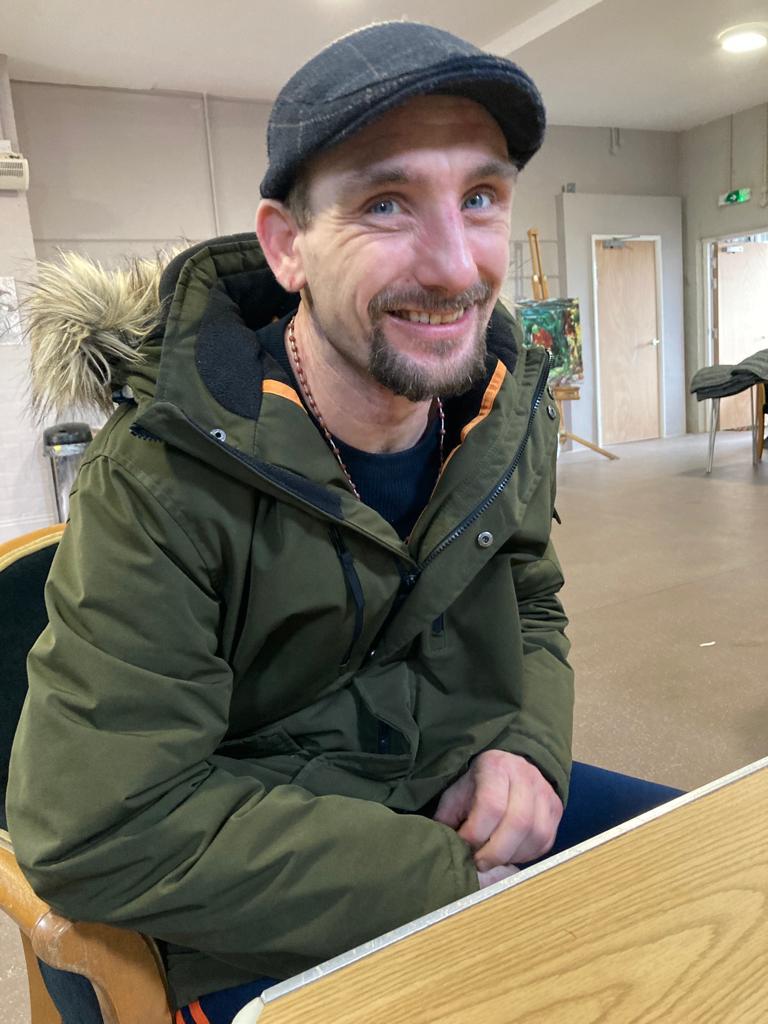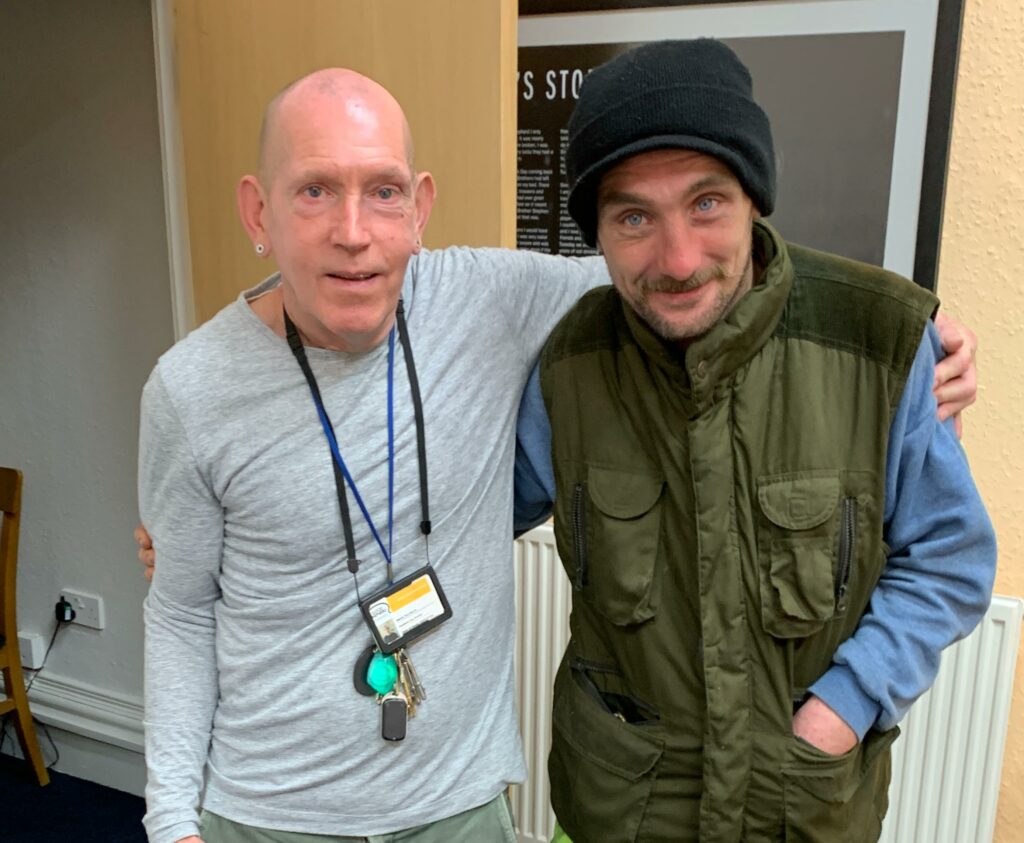There has been a time when Darryl had a partner and family, ran several businesses, bought and sold houses at auction, and had hundreds of thousands of pounds sat in his bank account.
And there have also been times when he has been sleeping in a subway, surrounded by faeces, spending £500 a day to satisfy his drug addiction and has walked to the top of a bridge, considering taking his own life.
Sometimes the line between living a ‘normal’ and contented life, and spiralling into danger and despair, can be very thin.
“I bit off more than I could chew,” explains Darryl, chatting at the Good Shepherd alongside his Project Worker Paul Burns, one of the Good Shepherd staff working on the Housing First programme.
“I had a lot of money to my name, much of it tied up in assets, had my own roofing business, was involved in a mate’s scrap business, and was buying and selling houses at auction.
“I think you can end up doing too much in whatever you are working in and that was me, I was drained and it was sucking the life out of me.
“That put pressure on the relationship I was in, and I ended up having an affair.
“From there I lost my businesses, lost my family, lost everything and just ended up spiralling, spending £500 a day on drugs for 18 months and all the money I had just dwindled away.
“I then found it difficult as my enemies were trying to nail me into the ground – I was stopped from seeing my family and I ended up in jail and then homeless when I came out.
“I was addicted to the drugs, smoking crack mainly, and was taking as many drugs and as much drink as I could, I just wanted my heart to stop.
“I went up to a bridge, and thought about throwing myself off, I had just had enough.
“People can make their own problems, can’t they? That’s what I did, and it got to a stage where I just didn’t give a **** about anything anymore.”
The Darryl from those days is very different to the Darryl now sat chatting and laughing as he answers a request to tell his story to raise awareness around World Homelessness Day and World Mental Health Day.
Being on the Housing First programme, a pilot scheme which offers accommodation to people with a history of homelessness who have multiple and complex needs, and then provides a support worker to help work through their issues, has been a godsend.
Darryl finally feels he has a reason to live again, and to look forward.
The final straw came a couple of years ago, when, whilst living on the streets in Birmingham, he woke up in a subway at 7.30am surrounded by dog and human faeces, and used and discarded needles.
“I was so weak, I just couldn’t move, I couldn’t get off the floor,” he recalls.
“Tears were just falling down my face – you know when you are a man and you cry you don’t start snivelling, the tears just come.
“A bloke walked past wearing a three-piece tweed suit – the very same suit I used to wear – with a briefcase.
“I looked up and was surprised he was walking through the subway, everyone else of his class used to walk along the top.
“I was literally on my hands and knees and I looked at him and he didn’t even bat an eyelid mate, he just walked straight on passed me.
“I mean, there was no reason why he should have decided to help me but for some reason that was it for me really, it was my lowest point and a reminder of how far I had fallen.
“It was then that I came back to Wolverhampton and tried to sort myself out.”

Assigned to the Housing First programme as one of the many supported by Good Shepherd staff in partnership with Wolverhampton Homes, Darryl was assigned Paul as his case worker.
Those on the programme are given accommodation and then practical support with furnishings and benefits as well as, perhaps equally as importantly, knowing they have that person to lean on and receive individually tailored support.
“Without this fella (pointing to Paul), ringing me every day, and this place (the Good Shepherd), I’d be absolutely screwed,” Darryl admits.
“They have done that much for me, from putting the clothes on my back to food in my stomach, letting me come and talk when I am stressed out and spitting fire, having someone there that I can have a cry to and a moan to.
“Even that can stop you doing something stupid, and without the support I’d be still on the streets because there’d be no focus for me, nothing to work towards.
“I dread to think where I would be, I’d be dead meat, probably in Danescourt (cemetery) next to my uncle.
“But what Paul does and what is so important has been to come at it from a different angle to help me sort myself out.
“I was snowballing out of control but before it turns into an avalanche it’s time to try and put a wedge in front of it do you know what I mean?!”
The wedge is holding so far, and the foundations are strong, but Darryl knows the progress will not always be in a straight line.
He is currently using his building expertise and knowledge around property to volunteer and help a friend carry out some work and, while not entirely off the drugs, has manage to limit his intake and, with Paul’s support, has the motivation to gradually be free of them on a step-by-step basis.
There will be hurdles and difficulties, and Darryl admits that there have been tough days when he has relapsed and gone through ’24 hours of madness.’
“The difference now is that Paul is there and supporting me and when I have those bad times I can get up and start again,” he insists.
“I am never going to use people’s kindness as a weakness, because I want to keep working and get back towards where I was before.”
That will also include hopes of re-connecting properly with his family whom he has previously let down, and he talks of his mother hearing ‘the drive in his voice’ on a recent telephone call.
And one day he would love to purchase and get back on a motorbike, rekindling a former passion.

“With Darryl, we have made a start, and while there is a long way to go, by hook or by crook we will get there,” says Paul.
“He is witty, good company and has so many skills and, for me, to see him start to get his life back on track at the moment is spectacular.
“We still have work to do but we have a chance now because he has made his flat into a nice little home and he is spending his money on food, electricity and so on and isn’t just using everything he has on his addiction.
“He has battled to get to where he is now, to put the pieces back into the jigsaw, and while we have been there to support him, he has achieved what he has so far by his own willpower and by wanting to change.”
On Darryl’s part, the will and the determination is certainly there to make the next chapter of his life far better than the last.
And to aim to one day return to a more regular and less dramatic existence.
“It’s nice not to wake up with that horrible and stinging feeling in my chest where I haven’t got anything, it’s half past seven in the morning, its freezing and going to piss down again, and I have nothing to do with my day,” he insists.
“Where my heart is sinking into my stomach because I think no one else gives a ****.
“I feel more independent now, I’ve got a bit of respect back for myself and other people have got respect for me – they can see how much I am trying.
“I’ve got some of my old pals back as well, people I knew before, and have got some purpose again.
“When I get up in the morning now the thought of drugs isn’t even in my head, I am focusing on what I want to do and how I am going to get there, step by step.
“It’s all thanks to the help I have received, and when I was offered a helping hand, it would have been mad to turn it down, and disrespectful, even feeling as low as I was.
“It’s really nice that Paul and the Good Shepherd have been able to do what they have, and now it’s all about keeping it going and carrying on moving forward.”
Onwards and upwards.